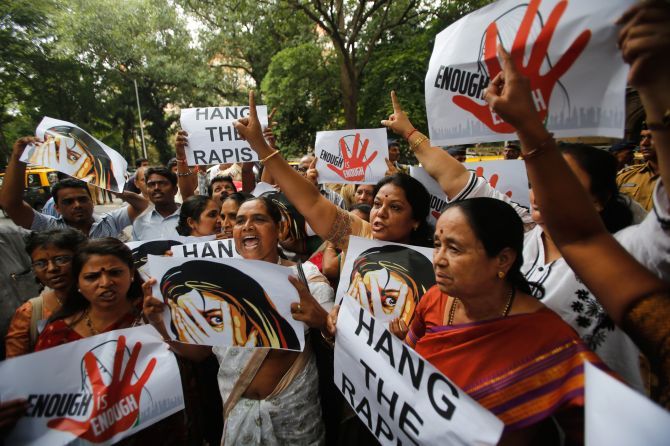'In Bollywood, the power is disproportionately in the hands of a few men, whether they are actors or producers or directors.'
'The woman who makes an allegation against them can forget working in the industry again,' says Aakar Patel.

On October 5, The New York Times published a report on Hollywood producer Harvey Weinstein's sexual misbehaviour. The newspaper quoted actresses who said that they had been harassed or assaulted by Weinstein, one of the most powerful individuals in the film industry, someone who produced Oscar-winning movies like The King's Speech.
After the report, more women came out with their stories of abuse from Weinstein (by the end of October, the list of accusers had over 80 women), and a couple of days later, he was sacked from his own company by the board of directors.
Over the month, more women, many of them famous, began to tell their stories openly, and now the focus turned to other powerful men.
These included the director James Toback (accused by over 238 women) actors Dustin Hoffman, Kevin Spacey, Steven Seagal and Ben Affleck, the stand up comedian Louis CK, the political analyst Mark Halperin and former US president George H W Bush.
Similar accusations have threatened the Senate campaign of a one-time favourite Republican candidate and ex-judge Roy Moore, and sitting Democratic Senator Al Franken.
Many of these men have apologised for their behaviour, including President Bush, and it is now clear that the women's courage had uncovered an epidemic.
It seems something has changed in America, even though this is not the first time that a wealthy and influential man has been exposed in similar fashion.
Only in 2014, one of America's most famous comedians, Bill Cosby, was accused by dozens of women of drugging and then assaulting them.
Most of the cases here were outside the statute of limitations (depending on the US state, the crime cannot be prosecuted if it is reported between three and 30 years after it took place).
However one case against Cosby is in court and it is likely to be decided some time next year. While Cosby's case was widely publicised, it did not produce the sort of general response that the Weinstein case did, and now every day is producing a report or two of a famous man who has been exposed.
A campaign on twitter began to take what was essentially an American moment international. So what has been the reaction in India?
It began with a list of academics, meaning professors and teachers, who were accused of harassment.
The accusers were anonymous but were apparently known to the individual who made the list public, a student in America named Raya Sarkar. One of the individuals on the list, the director of the Madras Music Academy has resigned, it was reported on November 16, after his name was published, though it was unclear if he had quit because of the allegation.
While the list has been attacked for being anonymous, for obvious reasons, it is not surprising that it is anonymous, given the history of sexual violence in India.
The government's data says that 99% of Indian victims of sexual violence do not report the crime to the police.
Even in the United States, only about a third or so of victims report because this is a crime that is a personal attack and the victim does not feel comfortable recounting the details.
In India, we have several other factors that are at work. One is a social and cultural landscape where women are often blamed for sexual violence committed on them.
Ours is a society that unfairly loads ideas of 'honour' on the person of the female. And then ours is also a society where the powerful man is almost never punished for anything wrong that he does.
In Bollywood, the power is disproportionately in the hands of a few men, whether they are actors or producers or directors. The woman who makes an allegation against them can forget working in the industry again, in addition to being humiliated, and the men can get away with almost anything.
In politics things are worse. Justice is impossible against the powerful political figure who is a predator. And political parties show absolutely no qualms in violating the privacy of individuals.
Innocent women are victimised merely for falling in love as the cases of the secretly recorded and intrusive 'sex tape scandals' show.
Given all of this baggage it would be wonderful if this becomes the moment when things change.
If they feel encouraged by the climate, Indian victims and survivors of such harassment and violence can choose to go public and bring about the same sort of focus on the crimes as the victims in the United States have managed to do.
It is cruel to put the burden of this on them, of course, and the only real solution for ending harassment or minimising it is to ensure that the law acts swiftly and punishes offenders.
But when the problem is also in parts cultural, the right moment can produce great change.
Other places have already failed their women. In response to the Weinstein story, China's State media has said that harassment of women was less common in China because 'Chinese men are taught to be protective of their women. Behaving inappropriately toward women, including harassing them sexually, contradicts every Chinese traditional value and custom.' This is, of course, rubbish.
It would be a shame if this opportunity passes because it is the sort of moment where a large section of the population can be turned.
They can be made more sensitive and more sympathetic to the victim, and more willing to set aside the social and cultural norms that in many ways have made the victim the guilty party.
Aakar Patel is Executive Director, Amnesty International India. The views expressed here are his own.
- You can read Aakar's earlier columns here.
Photograph: Danish Siddiqui/Reuters










